Alumni Spotlight Jefferson Alum Builds Hope in Home Country By Cindy Lefler Urological Surgeon Brings Healthcare and Education to Zimbabwe. Allen Chiura, MD, returned home to Zimbabwe for the same reason he left: hope. Growing up in an apartheid system, Chiura has vivid memories of his young world being separated into black and white—and then suddenly blended. “I remember being in primary school and not being able to play (sports) matches across the street at the government school because I was black,” he says. “And then I was 16 years old when independence came in 1980 and all of that changed; all of a sudden blacks and whites were just together, and we were growing this new country, and there was a little reconciliation and real great hope that existed.” He left Zimbabwe to attend college, medical school, and residency programs in the United States, staying for another 30 years to practice urological surgery in Delaware, Ohio and Oregon. But in 2011, he knew it was time to come home; it was time to bring more hope to a country that is still struggling to find the reconciliation and equality that independence never delivered. Chiura was born in Zimbabwe to a businessman-turned-educator father and health professional mother. His father Enos Chiura was the first chairman of BCCZ, the first pioneer bank after independence, and the first black CEO of the largest corporation in Zimbabwe. His mother, Faith Chiura, was a prominent nurse and midwife. Chiura attended American University in Washington, D.C., followed by the Medical College of Pennsylvania (MCP). As a youth, he was an athlete who played “every sport known to man.” When he suffered a serious knee injury at 16, the orthopaedic surgeon who repaired the damage made a great impression on him so he decided to set his sights a career as an orthopedic surgeon.
Just being a good doctor really means a lot to me. And I can honestly attribute that to the people that trained me at Jefferson. Dr. Allen Chiura 24
Year in Review
“The doctor was from Zimbabwe, but trained in the United States and came back,” he says. “He was an amazing surgeon and a really charismatic character. That was my first inkling that I wanted to do surgery.” Chiura planned to return to Zimbabwe as an orthopaedic surgeon, and to become the official doctor of the Zimbabwe Olympic team. There was only one problem—when he got to his third year of medical school and did a clinical rotation in orthopaedics, “I absolutely detested it.” Fortunately, there was another influence in his life that led him to urology. “My medical school advisor at MCP was a wonderful man. Dr. Allen Chiura, 1998 Jefferson Urology Residency He always seemed happy, so graduate I asked someone, ‘what does he do?’ They told me he was Brownstein, Irvin Hirsch, and David Rivas. a urologist, and I didn’t know what urology was, but I didn’t care. I said whatever that man After spending three decades in the United does, I want to do because he seems to have States building up his practice and his gotten it right.” After graduating from MCP, reputation, Chiura had an “aha” moment about Chiura applied for a urology residency at the returning to Zimbabwe. Actually, he says, it historically black Howard University Hospital was his wife’s “aha” moment. His wife, J. Nozipo in Washington, D.C. “Ever since I’d gone to Maraire, MD, is a renowned neurosurgeon school, I’d always been a minority,” he explains. and the author of “Zenzele: A Letter for My “In primary school and secondary school… in Daughter,” a New York Times “Notable Book of the U.K (where his family lived briefly when he the Year” and a Boston Globe best-seller. was young)… even in college and grad school in D.C., I was always a minority. And I thought It was one frigid Oregon winter day that to myself: I wonder what it would be like to be Maraire, also a native of Zimbabwe, gave in a majority situation.” Chiura an ultimatum.“It was the dead of winter. She goes out one morning to get into the car to He first had to complete a two-year residency go to work and she can’t open the door because in general surgery at Pennsylvania Hospital, it’s frozen. She comes back into the house to get and by the time he moved on to Howard, he some hot water to throw on the locks and says, found that the situation had changed. “I was ‘All right, that’s it. I’m done. By next winter, you there for a year and the program was shut better have me out of here.’” down,” he says. A mutual friend and colleague suggested he transfer to Jefferson. “And the rest is history.” Chiura, who completed his Jefferson residency in urology in 1998, says what he learned from his time at Jefferson went beyond a good medical education. “I am really passionate about taking care of people and delivering good healthcare, and that’s what I learned from Jefferson,” he says. “Just being a good doctor really means a lot to me. And I can honestly attribute that to the people that trained me at Jefferson.”
Chiura attributes his immense appreciation for “quality health and patient care” to his attending and peers at Jefferson. Specific faculty who impacted his urology training included Drs. Leonard Gomella, Demetrius Bagley, Grant Mulholland, “Sonny” Figueroa, Kenneth
The couple had always been active in helping their home country, collecting medical supplies and raising money to purchase provisions to send home to Zimbabwe.“We finally said, ‘Look, we obviously can have a much bigger impact, and the only way we’re going to be able to do that is go home and be there and do it,’” he says. They visited home in 2011 and had to make an immediate choice based on the availability of placement in a private school for their children. They decided on the spur of the moment: it was a “go.” They were in Zimbabwe a few months later. He admits the move home was not very well planned, and the first year-and-a-half was difficult. “But in hindsight it was the right



























